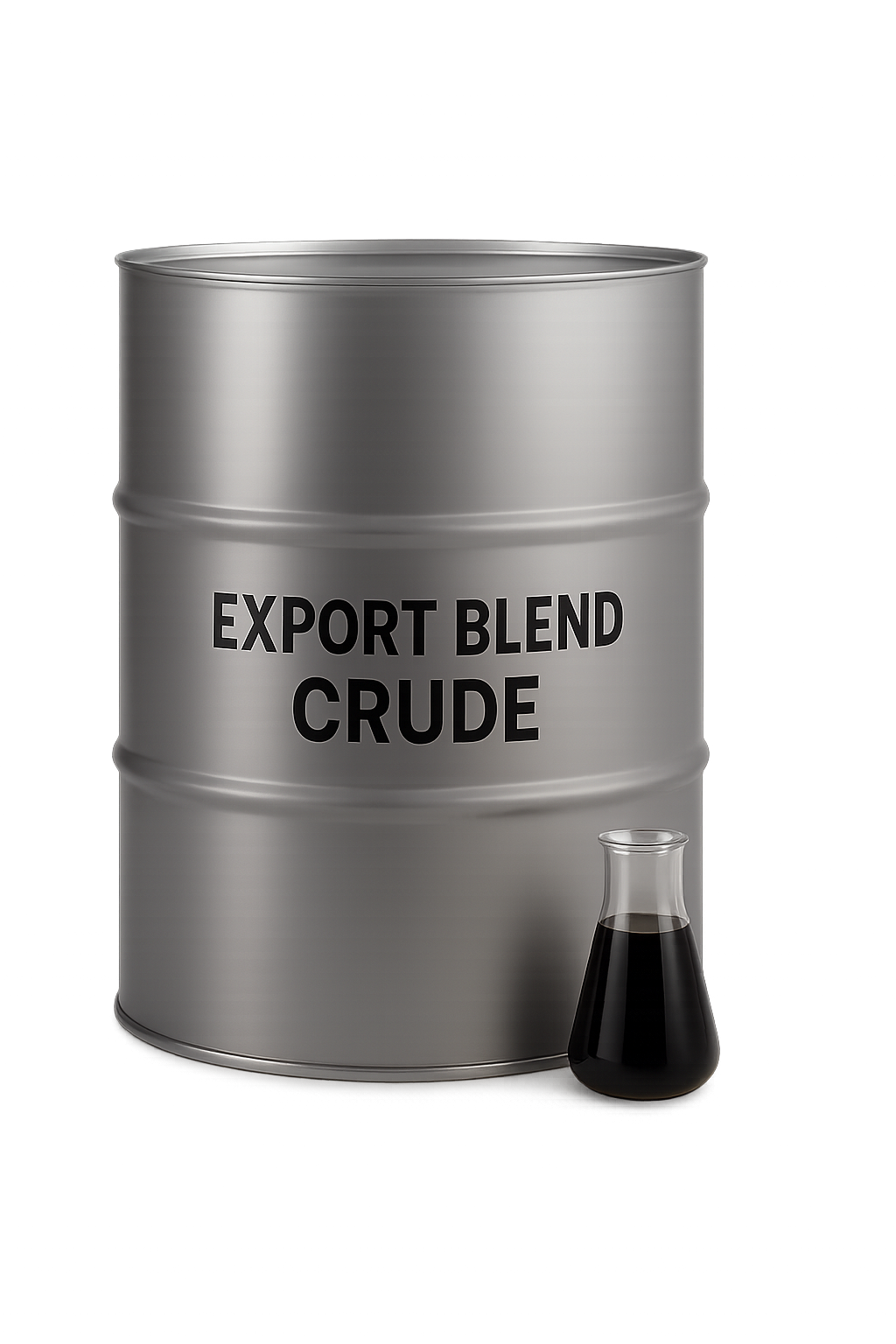
Export Blend Crude
Overview
Export Blend Crude Oil (EBCO) is a medium to light crude oil produced from blended streams of multiple oil fields for export purposes. It is typically designed to balance API gravity and sulfur content to meet refinery feedstock requirements while maximizing transport efficiency. Export blends are widely traded on international markets and used as refinery input for the production of gasoline, diesel, jet fuel, and petrochemical feedstocks.
Technical Characteristics
- Grade: Export Blend Crude (field-dependent composition)
- Appearance: Brown to black liquid, free-flowing at ambient temperatures
- API Gravity: Typically 30°–40° API (medium to light crude range)
- Sulfur Content: 0.5–1.5% by weight (sweet to medium sour, depending on blend)
- Pour Point: −30°C to 0°C (variable by source)
- Viscosity @ 40°C: 5–10 cSt
- Carbon Residue (Conradson): ≤ 10% by weight
- Salt Content: ≤ 200 lbs/1,000 bbl (ASTM D3230)
- Metals (Ni + V): Typically < 50 ppm combined
Specifications & Standards
- Tested against ASTM and ISO crude oil analysis protocols (API MPMS standards for gravity, sulfur, salt, water, and sediment)
- Supplied with a full Crude Assay Report including distillation yields and product cut profiles (naphtha, kerosene, gas oil, residue)
Applications
- Refinery Feedstock: Input for producing gasoline, diesel, jet fuel, LPG, and petrochemical naphtha
- Export Trade: Standardized blend for international buyers to ensure consistent refinery compatibility
- Blending Component: Used in downstream mixing to adjust API gravity and sulfur levels in refinery slates
Performance Advantages
- Balanced Properties: Optimized API gravity and sulfur content for refining efficiency
- Flexibility: Can be refined into a broad range of light and middle distillates
- Global Acceptance: Commonly recognized and traded grade for international shipments
Handling & Storage
- Transported via pipelines, tankers, and storage terminals under controlled conditions
- Requires heating only in colder climates depending on pour point
- Must be stored in inert-gas-blanketed tanks to reduce oxidation and water contamination
Compliance & Testing
- Crude cargoes are typically certified with Quality & Quantity (Q&Q) inspection reports from SGS, Intertek, or CIQ
- Standard laboratory testing includes: API gravity (ASTM D287), sulfur (ASTM D4294), water/sediment (ASTM D4007), salt (ASTM D3230), and metals content
Frequently Asked Questions
1. lobortis augue porta eu. Maecenas eget mauris tristique ?
Praesent aliquet et quam at tempus. Orci var natoque penati magnis disw parturien monascetur ridiculus condimentum pharetra interdum.
2. Sobortis augue porta eu. Maecenas eget mauris tristique ?
Praesent aliquet et quam at tempus. Orci var natoque penati magnis disw parturien monascetur ridiculus condimentum pharetra interdum.
3. Cobortis augue porta eu. Maecenas eget mauris tristique ?
Praesent aliquet et quam at tempus. Orci var natoque penati magnis disw parturien monascetur ridiculus condimentum pharetra interdum.
4. Dobortis augue porta eu. Maecenas eget mauris tristique?
Praesent aliquet et quam at tempus. Orci var natoque penati magnis disw parturien monascetur ridiculus condimentum pharetra interdum.
5. Dobortis augue porta eu. Maecenas eget mauris tristique?
Praesent aliquet et quam at tempus. Orci var natoque penati magnis disw parturien monascetur ridiculus condimentum pharetra interdum.
6. Dobortis augue porta eu. Maecenas eget mauris tristique?
Praesent aliquet et quam at tempus. Orci var natoque penati magnis disw parturien monascetur ridiculus condimentum pharetra interdum.